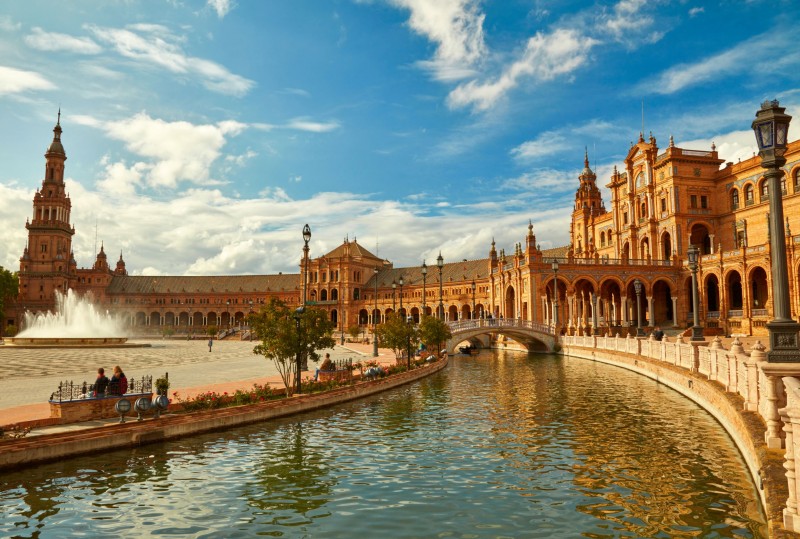article_detail
Date Published: 21/10/2021
ARCHIVED - Seville will be the first city in the world to name heatwaves
Andalucía supports the fight against climate change by promoting scientific initiative to name episodes of very high temperatures

In August last year, the city of Seville and a large part of Seville province experienced a heatwave with temperatures of over 40 degrees Celsius for six consecutive days, with maximum temperatures reaching as high as 46.
The sweltering temperatures in Seville from August 12 to 17 were just a localized part of a heatwave that affected a large part of the Mediterranean, associated with the subtropical anticyclone known as Lucifer. For that reason, people just started calling the heat wave itself Lucifer.
But officially, heatwaves don’t have names. Not in the same way typhoons and hurricanes do. Hurricanes have been given names for over a century, and we’re all familiar with such famous examples as Hurricane Katrina, and even more recently adverse weather fronts like Storm Filomena in Spain.
Now, the rise in sudden episodes of elevated temperatures is prompting scientists to call for the naming convention to be extended to heatwaves.
Why do hurricanes have names? Should heatwaves have names too?
Experts claim that assigning proper names to adverse meteorological phenomena helps to keep track of them, as well as allow the media to disseminate information about them more easily, helping to keep people safe and prepared.
The names of typhoons and hurricanes are currently assigned globally from a predetermined list drawn up by the World Meteorological Organisation (WMO), while regional phenomena such as anticyclones and high-impact squalls are named by the corresponding meteorological services (in the case of Spain, the Southwest European Group).
For at least two years, various institutions have been promoting the idea of naming heatwaves, in anticipation that they will become increasingly frequent and severe due to the climate crisis. The Greek government, for example, expressed its support for such initiatives last summer, while the states of California and Florida have also called for proper names to be given to these warm spells.
The decisive step towards naming heatwaves, however, seems to have come from Seville. It is not that the Andalusian capital has decided to name, on its own, everything hot that happens to the city, but the local authorities have given their support to an international scientific and academic initiative to create an official system for naming heatwaves.

“Extreme heat waves are becoming more frequent and devastating as a direct effect of climate change,” explained Seville Mayor Juan Espadas. “Local governments must address the threat that heat poses to our populations, particularly the most vulnerable, by raising awareness of heat-related health hazards through evidence-based science and data.”
“Seville is proud to become the first city in the world to develop and implement a heat wave naming and categorisation system that aims to save thousands of lives and we encourage other cities around the world to undertake this great effort as well.”
International coalition to save lives
The project to develop a formal system of naming and categorising heatwaves is led by the Adrienne Arsht-Rockefeller Foundation’s Resilience Center of the Atlantic Council; a Scientific Advisory Panel composed of leading climatologists and public health, disaster relief and social and behavioural scientists; the Spanish State Meteorological Agency (Aemet); the Spanish Climate Change Agency; the University of Seville and Pablo de Olavide University.
The aim is to present an official project to name heatwaves in 2022, highlighting the impact of these phenomena on human health, as heat is one of the main climate-related killers in Seville and other cities in Europe.
“Heat waves have been dubbed ‘the silent killer’ for a reason,” said Kathy Baughman McLeod, senior vice president and director of the Adrienne Arsht-Rockefeller Foundation's Center for Resilience. “They wreak invisible havoc on our economies, prey on the most vulnerable members of society, and kill more people than any other climate threat, but the dangers they pose are vastly underestimated and severely misunderstood.”
Naming heatwaves will help when implementing safety measures at the local level, “such as opening air-conditioned shelters or adding additional staff to emergency rooms” and will also serve as an integral component of “cities’ disaster and emergency response planning”.
“Naming and categorising heat waves will go a long way in giving people and municipalities the opportunity to fight heat, build a culture of awareness and save lives,” concluded Ms Baughman McLeod.
Images: Archive
Loading
Sign up for the Spanish News Today Editors Roundup Weekly Bulletin and get an email with all the week’s news straight to your inbox
Special offer: Subscribe now for 25% off (36.95 euros for 48 Bulletins)
OR
you can sign up to our FREE weekly roundup!
Read some of our recent bulletins:
Discount Special Offer subscription:
36.95€ for 48 Editor’s Weekly News Roundup bulletins!
Please CLICK THE BUTTON to subscribe.
(List price 3 months 12 Bulletins)
Read more stories from around Spain:
Contact Spanish News Today: Editorial 966 260 896 /
Office 968 018 268














